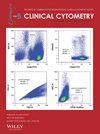人工智能在流式细胞术中的应用现状及未来发展方向。
IF 2.7
3区 医学
Q3 MEDICAL LABORATORY TECHNOLOGY
引用次数: 0
摘要
流式细胞术是一种分析多种细胞特性的强大工具,在免疫学研究、临床试验和诊断中至关重要。将人工智能(AI)集成到流式细胞术中有可能增强检测开发和应用的各个方面,包括试剂选择、仪器标准化、面板和检测设计、数据分析、质量控制和知识传播。本文综述了人工智能在流式细胞术中的应用现状,并探讨了人工智能在该领域集成的潜在未来方向。本文章由计算机程序翻译,如有差异,请以英文原文为准。

AI in flow cytometry: Current applications and future directions
Flow cytometry is a powerful tool for analyzing diverse cellular properties, making it essential in immunology research, clinical trials, and diagnostics. Integrating artificial intelligence (AI) into flow cytometry has the potential to enhance various aspects of assay development and application, including reagent selection, instrument standardization, panel and assay design, data analysis, quality controls, and knowledge dissemination. This paper provides a review of current AI applications in flow cytometry and explores the potential future directions for AI integration in the field.
求助全文
通过发布文献求助,成功后即可免费获取论文全文。
去求助
来源期刊
CiteScore
6.80
自引率
32.40%
发文量
51
审稿时长
>12 weeks
期刊介绍:
Cytometry Part B: Clinical Cytometry features original research reports, in-depth reviews and special issues that directly relate to and palpably impact clinical flow, mass and image-based cytometry. These may include clinical and translational investigations important in the diagnostic, prognostic and therapeutic management of patients. Thus, we welcome research papers from various disciplines related [but not limited to] hematopathologists, hematologists, immunologists and cell biologists with clinically relevant and innovative studies investigating individual-cell analytics and/or separations. In addition to the types of papers indicated above, we also welcome Letters to the Editor, describing case reports or important medical or technical topics relevant to our readership without the length and depth of a full original report.

 求助内容:
求助内容: 应助结果提醒方式:
应助结果提醒方式:


